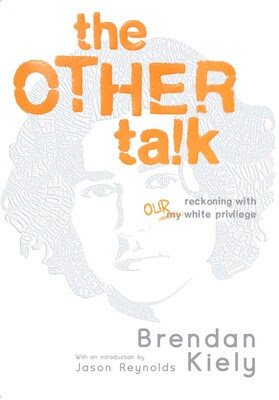the OTHER talk: reckoning with OUR my white privilege*
by Brendan Kiely, with an introduction by Jason Reynolds
Published by Simon & Schuster
Publication in 2021
Reviewer: Debbie Reese
Review Status: Highly Recommended
****
In the last few years, the word "reckoning" has appeared a lot. In meaning, it has to do with facing up to truths. Way back in the 1990s when I started graduate school, I read White Privilege: Unpacking the Invisible Knapsack by Peggy McIntosh. She was learning whites are taught not to recognize white privilege. It was, she wrote, unacknowledged privilege. It was vivid writing that stuck with me.
As I read Brendan Kiely's the OTHER talk: reckoning with OUR my white privilege, I thought back to McIntosh's essay. It was published in 1989. In a way, what Kiely offers to us, 32 years later, is a more in-depth reckoning. I'm sure McIntosh got push back for what she wrote, and I wonder what sorts of pushback Kiely is getting for his book. We are in a very heated period in society. Social media has been a great tool for social justice but it has also been used in harmful ways. I don't want to go on about that, so I'll turn back to the book.
Those of you who pay attention to visibility or invisibility of groups of people in the US know that one report after another leaves Native people off, or uses an asterisk that says data on us is statistically insignificant, so none is provided. In chapter 15 of the OTHER talk, Kiely writes about an anti-racist training he went to, where Native people were not included in an exercise the group was doing. He and others there did not notice that omission, but then, he writes (p. 154):
The facilitators were about to move on to their next exercise when a Native American woman in the audience stood up. She wanted to know why the racetrack model, why the entire workshop, did not include or allude to, in any way, Indigenous people in the United States. "This," she went on to explain, "is the kind of erasure we face every day."
Kiely writes that he was floored. The facilitators had not realized what they were doing, and neither had he or other participants. It seems to me that one wave of realization was washing over him when another one struck. What made it all worse, he says, is that the workshop was taking place in Albuquerque, New Mexico, and part of the focus was to acknowledge local Indigenous cultures. Each day, the conference started with a welcome from the Navajo, Apache, or Pueblo Nations. He recounts all that, and more, on those pages.
There's more to that experience in chapter 15 than what I shared above, but I'm sitting with that particular part of it. It happens to Native people all the time. We're here, right here beside you, and still so unseen, on lands that were/are homelands to Native people. The welcome to the workshop (provided by Native people) feels to me a lot like land acknowledgements. Something is said, and then forgotten. Kiely's book starts with praise for the book, offered by a wide range of people. I assume his publisher sought out people to write those paragraphs of praise. I can't help but notice there is not a Native person amongst them. That, I think, is unfortunate but also reflects precisely what spoke to me about that passage in chapter 15 of the book.
I deeply appreciate that Kiely shared that experience in Albuquerque. There are other reasons why I'm highly recommending the OTHER talk but I'll leave that for you to find, on your own.
Get a copy and talk about it with others. It is written for young people, but every adult should read it, too. As far as I know, neither Kiely or Jason Reynolds are Native.
*I was not able to include "my" as a strike-thru on the title for this blog post. It is part of the title of the book.

